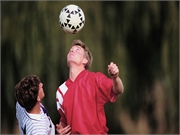- Are You Making This Expensive Thermostat Error This Winter?
- Recognizing the Signs of Hypothyroidism
- 10 Strategies to Overcome Insomnia
- Could Artificial Sweeteners Be Aging the Brain Faster?
- Techniques for Soothing Your Nervous System
- Does the Water in Your House Smell Funny? Here’s Why
- Can a Daily Dose of Apple Cider Vinegar Actually Aid Weight Loss?
- 6 Health Beverages That Can Actually Spike Your Blood Sugar
- Treatment Options for Social Anxiety Disorder
- Understanding the Connection Between Anxiety and Depression
What Parents Need to Know About Teens and Concussions

Concussion symptoms aren’t always evident, so parents of student-athletes need to know the signs and seek a diagnosis if their teen gets hurt, experts say.
Only those closest to a teen may be able to identify the sometimes subtle changes in mood and emotion stemming from a concussion, said Dr. Rory Tucker, a sports medicine specialist at Penn State Bone and Joint Institute in Hershey, Penn.
“Parents may notice a change in their teen’s sleep patterns,” Tucker explained. “He or she may be more withdrawn, socializing less with friends or family members, more emotional or tearful. They may have anger outbursts or be more nervous than they were before.”
Since doctors may be unfamiliar with a patient’s usual mental state, parents need to advocate for their children.
“Medication is rarely necessary in the long term, but while a concussion is healing, it can sometimes be beneficial to take medication to control moods,” Tucker said in a Penn State news release. “We also use medications to assist with sleep. Impairment of sleep can have a detrimental impact on emotional health and how people interact with others.”
It’s also important for parents to know that concussion symptoms can be similar to those of depression and anxiety, and that a concussion can worsen existing mental health problems.
Dr. Craig DiGiovanni is a postdoctoral fellow in psychiatry and behavioral health at Milton S. Hershey Medical Center in Hershey. He said, “Parents should look out for more concerning symptoms of depression that are outside the scope of common concussion symptoms, like loss of interest in activities, significant weight gain or loss, feelings of worthlessness and suicidal thoughts.”
The lifestyle changes that can arise from a concussion may also be difficult for a teen, he added.
When injured student-athletes are no longer able to partake in their sport, parents can help “provide them a sense of purpose in other forms,” DiGiovanni said. Support groups are another option.
“No matter what their injury, they are not alone. There is help,” he said. “Young people can get help from those who came before them and help those who come after them. They can gain a lot of strength in believing they still have purpose.”
More information
Learn more about concussion from the U.S. Centers for Disease Control and Prevention.
Source: HealthDay
Copyright © 2026 HealthDay. All rights reserved.










